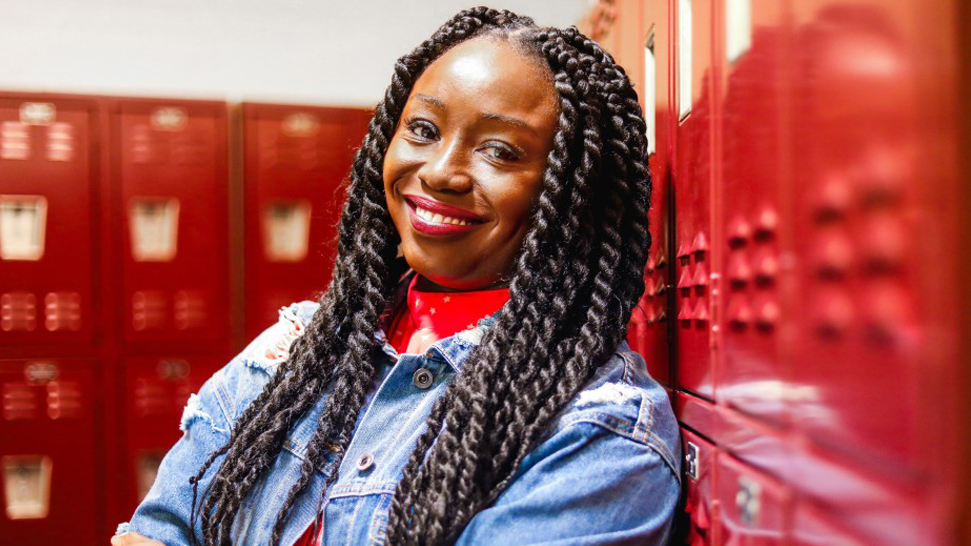Jocelyn Bioh made her Broadway debut in 2014, when she was in the ensemble of the cast of the Tony Award-winning play The Curious Incident of the Dog in the Night-Time. It was a dream gig for an actor: a steady paycheck, performing for over a thousand people every night. But after a year, Bioh decided to leave the show. She wanted to be a playwright.
Bioh describes herself as a “spiritual person,” and at that point, she had felt “really called and led to really commit more to my writing.” When Bioh thought about what kind of career she wanted to have, Lucille Ball and Issa Rae came to mind—female performers who also created their own opportunities. Explains Bioh: “These are women who thought very clearly and carefully about what their artistic legacy was going to be, or the kind of mark they wanted to make. There’s a lot of intentionality that goes into that. And there was no way I could achieve that kind of goal by continuing to be in an ensemble of a show. I had to then step out on faith and really bet on myself.”
Bioh bet big, and she won. She had started to write a play in her dressing room at Curious Incident called School Girls; Or, The African Mean Girls Play. That play was produced Off-Broadway in 2017 and became a hit—it’s been produced around the country and in London. And now Bioh is back on Broadway, this time as a playwright, with Jaja’s African Hair Braiding, which begins previews at the Samuel J. Friedman Theatre September 12, as part of Manhattan Theatre Club‘s season. An A-list roster of women is part of the producing team, including LaChanze and Taraji P. Henson.
This is a doubly momentous moment for Bioh. In July, she welcomed her first child with her husband, actor Austin Smith. When she spoke with Playbill, Bioh was just one week postpartum, but she was remarkably at ease—she had just put her newborn down for a nap, and Smith was keeping an eye on things. When I complimented her on the kimono she was wearing for the interview, she smiled, relieved, and said, “Thank you. That’s a day after being covered in spit up and what have you.”
When asked how Bioh was going to balance rehearsing and opening a Broadway play while juggling the needs of a newborn, she pointed out that it wasn’t as hard as expected because she and her husband, who also split their time working in film and TV, “are now a united-in-our-strike household…And we’ll have time to focus on the baby. I also have a great partner in [Jaja‘s] director, Whitney White, who is also a mother of less than a year, and she understands what it’s like balancing a theatre schedule and motherhood. And so we’re all going to just work together and figure it out.”
But perhaps it’s apt that Bioh’s personal life is seeping into the premiere of Jaja—the play itself was inspired by Bioh’s experiences growing up in upper Manhattan in a rent-controlled apartment. Jaja is set in a hair-braiding salon in Harlem, owned by a Senegalese immigrant named Jaja and staffed by women hailing from different countries in Africa. Bioh’s parents immigrated from Ghana in 1968, and Bioh took inspiration from the real-life African-owned hair-braiding salons of Harlem for her play, where she has spent many hours in the chair (Bioh has been wearing her hair in braids since she was four years old).
“I’m born and raised in New York. I grew up in Washington Heights, and I spent my life in a hair-braiding salon,” explains Bioh. “I have many, many, many, many years of experience sitting in a chair for hours and hours—seeing the myriad of different African women who all work in a salon braiding people’s hair, and all of their stories.”
In the script, she dedicates Jaja to “you amazing women. And thank you for what you do. To many people, you are just ‘hair braiding ladies’—random African women people pass by on the street, but to me, you are heroes, craftswomen and artists—with beautiful, gifted and skilled hands.”

Jocelyn Bioh
The women in Jaja are a host of different personalities, from the owner Jaja, who is flamboyant and larger-than-life, to her more reserved daughter Marie, who wants to go to college instead of running the salon. There’s also Bea, the woman who has been at the shop the longest, and who has a rivalry with newcomer Ndidi, who braids faster than anyone in the shop. The play has a cast of 14 and takes place over the course of a day. There is conflict, there is drama, but there is also love and laughter. In the melting pot that is New York City, these women of different origins gossip, bicker, and take care of each other. In one moving scene, one character’s hands are blistered from spending her days repetitively braiding, and two other characters insist on tending to her hands so they don’t swell up.
To Bioh, the play is a way to showcase the real ad-hoc community of immigrants that exist just a short subway ride north—there, everyone is an “auntie” or “uncle,” even if they’re not related to you. They may have all come from different countries, but in a place like Jaja’s salon, they set aside their differences to help one another.
“When they all come over to the States, whether they’re family by blood or they become family, they look out for each other, they help each other out with anything from, like, ‘here’s where you go to get your Social Security card,’ to, ‘here’s the best place to buy rice.’ You look out for each other.”
The women in Jaja are neighborhood stewards—not only do they take care of each other, they also take care of the women who come into the shop. Bioh positions the salon as a place where Black women can come and literally let their hair down.
“There’s a huge aspect of vulnerability when you’re a woman who’s walking into a shop. You have your natural hair out—maybe you don’t love how it looks, maybe you just want a different look,” she says. Those women come in feeling uncertain about themselves and leave feeling beautiful and cared for.
Bioh hopes for that same experience for the Black women who come to see Jaja on its big Broadway stage, recalling her own journey to self-acceptance: “I’m a dark-skinned woman, I had my own journey of owning my own beauty, and really coming to love who I am and accept who I am as a dark-skinned woman. And that took me a very, very, very long time, well into my adulthood.” She is pensive in adding that if she had seen a play like Jaja, with its diversity of Black women on the stage, maybe her own journey wouldn’t have been so rough.
“I know that it’s become, like, old hat to say, ‘representation matters.’ But I think that in this case, it really does apply. The kind of power of that I would have felt, as somebody who walked into a Broadway theatre and sees a hair-braiding salon on stage with a myriad of Black women’s faces and different hairstyles and textures and all of that…that is something really, really powerful,” Bioh emphasizes. “I’m just hopeful that the representation alone will give them that seed of power and to feel reflected in a beautiful way.”
Since School Girls, Bioh has become a go-to playwright for work that is joyous, funny, and profound. She followed School Girls with Nollywood Dreams, about a young woman who wants to be a movie star in Nigeria. Her most recent project, the musical Goddess, is about Marimba, the African goddess of music (it had a well-received run at Berkeley Repertory Theatre). Jaja contains plenty of opportunities for laughter—the women in the salon bicker and gently poke fun at each other. But at the same time, if you’ve seen one of Bioh’s plays, you know there’s always a bite to it, a moment where the laughter dies in your throat and the play surprises you with a gut punch. It’s no wonder since Issa Rae is one of Bioh’s inspirations. As Bioh puts it, “Comedy is just a funny way of being serious.”

Nike Kadri, Nabiyah Be, Paige Gilbert, and Mirirai Sithole in School Girls
Joan Marcus
In School Girls, there was the moment when it stopped being a comedy about girls trying to compete in a school beauty pageant to a play about colorism, and what kind of girls are considered more beautiful and valuable. Jaja, similarly, has a turn, when the play transforms from a beauty-shop comedy to a meditation on immigration, and what it looks like for Africans. That balance, of laughter and heart, is key for Bioh in all of her plays.
“As somebody who is first generation…I just feel this responsibility to really humanize our experiences and add to the conversation of how we’re reflected in media, particularly in theatre,” says Bioh. “So I have to have that bite, because otherwise, it’s just pointless. Otherwise, we’re just laughing at Black people. And America doesn’t need to do that anymore.”
For Bioh, there is power in showcasing the lived experiences of a certain group of people—as a way to inspire empathy, and understanding. Because for Bioh, what’s also been beautiful about how her plays have been received are the diversity of people who have come up to her saying they saw themselves in her characters. She hopes for the same with Jaja.
“We all have a deep universality in our stories and our struggle,” she says. “We are all people trying to live our lives as best we can, in a system that is deeply committed to keeping us down, by a white patriarchal society. Any and every Black person on any continent has that awareness and understanding of that. Jaja’s shop is a safe space where all of these ladies can just be.”
This post was originally published on this site be sure to check out more of their content.







